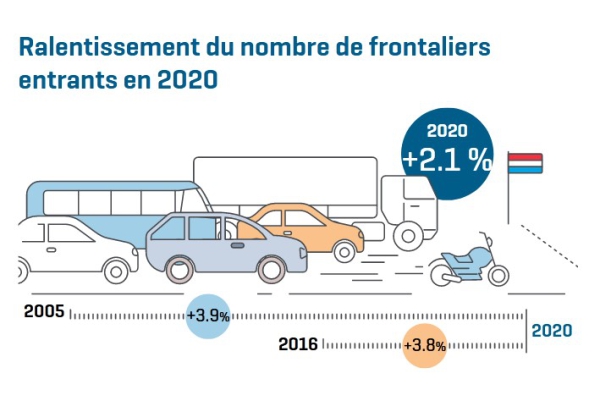 Credit: STATEC
Credit: STATEC
Luxembourgs Statistics agency STATEC has announced that in 2020, the remuneration of incoming cross-border workers in Luxembourg amounted to €12.3 billion, while the remuneration received by outgoing cross-border workers amounted to €1.8 billion, resulting in a net deficit of €10.5 billion in the balance of payments.
Contrary to previous years, social benefits paid to non-residents (not including unemployment benefits and financial aid to students living abroad) exceeded the social contributions received as a result of the short-time working scheme set up following the coronavirus crisis. Indeed, the partial unemployment scheme for cases of force majeure linked to the COVID-19 pandemic has led to a significant increase in social benefits paid to cross-border workers. A return to normal is nevertheless to be expected once this support measure comes to an end. It should be noted, however, that unemployment benefits paid to residents of neighboring countries, which amount to €26.7 million in 2020 and financial aid to students residing abroad of €28.1 million, were not counted as social benefits.
The phenomenon of cross-border workers is of considerable importance in Luxembourg. In 2020, the Grand Duchy ranked third in Europe in terms of the amount of cross-border remuneration. Only Switzerland and Germany recorded higher cross-border remuneration. Between 2005 and 2020, the number of cross-border workers entering Luxembourg increased by 3.9% on average per year. The economic crisis of 2007-2008 only seemed to have had a limited impact on the number of incoming cross-border workers. The increase in the number of cross-border workers nevertheless slowed down in 2020 (up 2.1%) after an increase above the average recorded between 2016 and 2019.
Breakdown by country of residence
Among the 204,489 cross-border workers employed in Luxembourg, France represented the most, at 52% of salaried cross-border workers in Luxembourg. While this share remained stable between 2005 and 2020, that of cross-border workers from Germany has increased since 2005 and stands at 24% in 2020. Belgian cross-border workers have seen their relative share decrease since 2005 to reach 24% in 2020.
Different annual salaries depending on the country of origin
The average annual salary (without social security contributions payable by employers) earned by incoming cross-border workers varies according to their country of origin. In 2020, French cross-border workers received around €47,000 per year, i.e. €11,100 less per year than their Belgian colleagues and €11,600 less than their German colleagues.
This gap is explained by the “specialisation” of cross-border workers in sectors characterised by differences in wages. Compared to Belgian and German cross-border workers, French cross-border workers are over-represented in less well-paid activities such as the Horesca sector or trade. In addition, French cross-border workers have a younger age structure, which may also explain the differences observed, noted STATEC.
The number of cross-border workers entering Luxembourg (204,489 in 2020) is much higher than that of outgoing cross-border workers (13,374). However, in reality, only 1,573 people from Luxembourg actually crossed borders to go to work in France, Belgium or Germany in 2020 since the majority of outgoing cross-border workers (88% in 2020) work with European institutions or non-European international institutions.
Indeed, several European institutions such as the European Commission, the European Investment Bank, the European Court of Justice and the European schools are located in Luxembourg. Other non-European extraterritorial entities such as Eurocontrol, the EFTA Court of Justice and the NSPA (Nato Support and Procurement Agency) are also present on Luxembourg territory. In 2020, the total employment of international organisations in Luxembourg amounted to 15,180 of which 11,880 live in Luxembourg. The other 3,403 employees of international organisations in Luxembourg reside either in Germany, France or Belgium and the flows of their remuneration are not considered in Luxembourg's balance of payments because they are transactions between two non-resident entities. Among outgoing cross-border workers, civil servants from international institutions receive higher salaries on average than Luxembourg residents working in neighboring countries. This is explained in particular by their higher level of qualification and the differences between the rates of social security contributions payable by employers.
Increase in social benefits following short-time working set up in the context of the COVID-19 pandemic
In 2020, unlike in previous years, the social benefits paid exceed the social security contributions collected.
Indeed, the partial unemployment scheme for cases of force majeure linked to the COVID-19 pandemic has led to a significant increase in social benefits paid to cross-border workers. A return to normal is nevertheless to be expected once the end of this support measure.
It should be noted, however, that unemployment benefits paid to residents of neighboring countries, which amount to €26.7 million in 2020 and financial aid to students residing abroad of €28.1 million, are not counted as social benefits.








